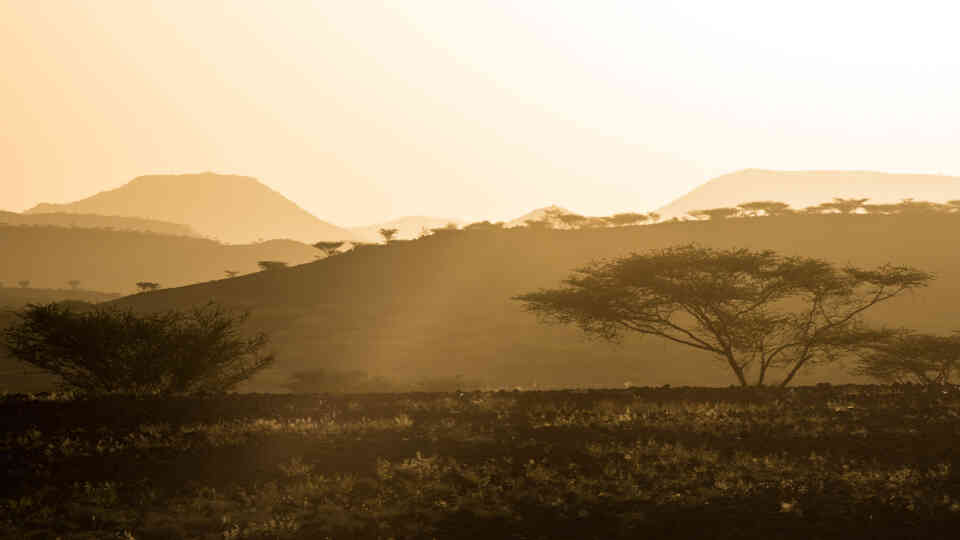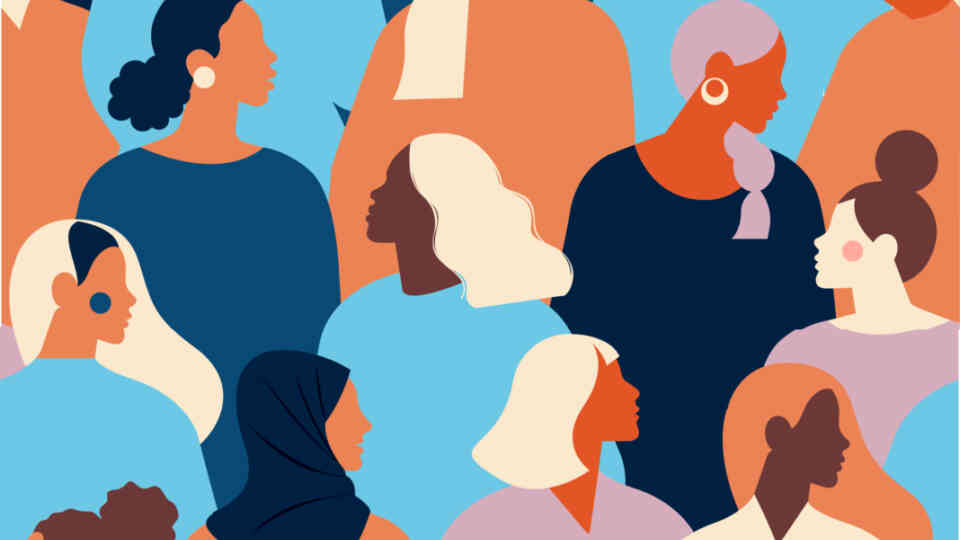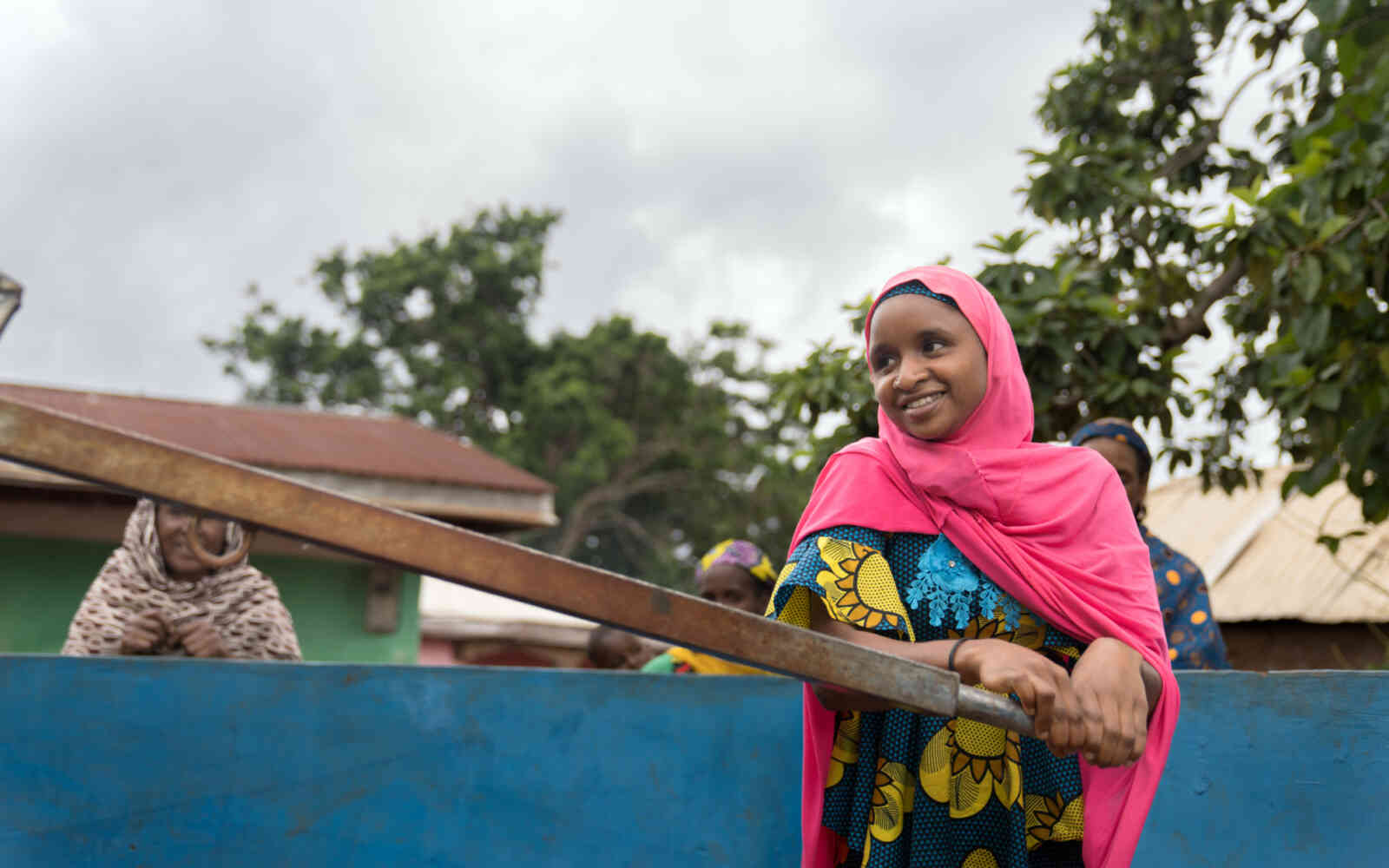The United Nations Office for Project Services (UNOPS)

Supporting women's empowerment in rural areas of Africa
Women play a key role in producing food, generating income, and fuelling local and global economies in rural areas.
Gender equality and the empowerment of women are key in the fight against poverty and hunger, and in mitigating the impact of climate change. Across Africa, UNOPS works with our partners to increase access to educational and training opportunities, income-generating activities, gender-sensitive health services, safe drinking water and so much more for women living in rural areas
Cameroon
Cameroon
In some rural areas of western Cameroon, dilapidated infrastructure – or none at all – has made accessing groundwater extremely difficult, forcing people to turn to unsafe water sources.
“We used to go to the river to get water from there. It’s quite far and the water there has many problems,” explains Chaida Balkissou, a resident of Koupa Menke-Ori village. “There would be cows and other animals [polluting the water].”
With funding from the Korean International Cooperation Agency, UNOPS is working with the government of Cameroon and local communities to bring clean drinking water to more than 120 villages across 3 different regions of the country.
In Bafolé, Awah Njikam is the treasurer of her village’s water management committee, which is responsible for overseeing the management and maintenance of the water infrastructure.
At the end of each month, she collects payments to cover the amount of water people have used. This money is then put into an account and used to cover maintenance and development costs as needed.


In a region where women tend to be excluded from decision-making roles, encouraging and ensuring their involvement in the committees has been an important part of the project's community outreach.
Democratic Republic of the Congo
Democratic Republic of the Congo
Decades of war in the east of the Democratic Republic of the Congo have disrupted production and trade and displaced huge numbers of people.
The Integrated Programme for Agricultural Growth in the Great Lakes Region (PICAGL) – funded by the World Bank – aims to boost agricultural productivity and improve regional agricultural sector integration.
In the Democratic of the Congo, UNOPS is improving existing irrigation systems and rehabilitating agricultural feeder roads to increase access to markets for local farmers – including for thousands of women in villages in South Kivu and Tanganyika.
The programme has also provided temporary employment for almost 900 women from the area – women like Riziki Sifa Bakari. From South Kivu, Riziki received team leader training as part of the programme.
"At the end of the training, I returned home and went to work. This work allowed me to buy three goats and start my business, which enabled me to send the children to school," says Riziki.
"And now I'm taking part in this training course for site managers – I can't wait to finish so I can get another job and continue taking care of my family," she adds.
My story
Listen to women from Cameroon, The Gambia, Guinea, South Sudan and Zimbabwe tell their stories.
Guinea
Guinea
Kanoukpè Mammy struggled to find work after dropping out of school early. Faced with limited economic opportunities, she became involved in petty crime. “Whenever I would see something that didn’t belong to me, I would tell myself to take it if I liked it,” she explains.
To give Kanoukpè and others like her the chance to break the cycle of poverty and learn new skills, UNOPS helped provide vocational training and small business grants as well as psychosocial support, with funding from the European Union.


Kanoukpè learned about vegetable farming. She is now responsible for a small group of farmers who grow peppers and sweet potatoes, which they sell to surrounding communities. Eager to share her knowledge with others, she has become a role model for her community.
Kenya
Kenya
Kenya has one of the highest rates of maternal mortality in the world. To help address this challenge, UNOPS supported UNICEF with strengthening maternal and child healthcare services to reduce maternal mortality and neonatal deaths across five of the worst affected counties in Kenya – including in Turkana.
For healthcare facilities to be gender-responsive, they need to address the unique needs of everyone using them, including women. To ensure that the privacy, hygiene, and safety needs of expectant mothers were taken into account, the maternity ward in Turkana's Lodwar County Referral Hospital was renovated. A post-delivery recovery room and a kangaroo-care room were added and a new operating theatre was built exclusively for maternal and infant health-related surgeries.


Catherine Nasike is a Community Health Volunteer in Turkana. Whenever she hears that a woman is pregnant, Catherine visits them as soon as she can to encourage prenatal care. She often refers women to the clinic and even accompanies them on their visits.
Catherine was just 16 when she gave birth to her son Gilbert – it was a complicated pregnancy. After being transported by boda boda (motorbike taxis) to the Lodwar County Referral Hospital, she was forced to wait several days to deliver her baby because the hospital was not equipped to treat her complications over the weekend.


Reflecting on her own experiences with childbirth, she believes that the information and support that community health volunteers provide would have been very helpful.
“If it was now, it would be different,” says Catherine. “I would have much more help and the hospital would be able to do the delivery anytime without waiting.”
Sierra Leone
Sierra Leone
Rural areas in Sierra Leone have long struggled with accessing a reliable source of power. For health centres, this put patients at risk and made the jobs of healthcare workers all the more challenging.
Konnie Bangura knows first-hand just how serious a lack of electricity can be as she recalls the birth of her first child. “The lighting was so bad that as the nurse was trying to deliver him, she mistakenly cut him on the forehead with the equipment being used. He has that scar till today,” says Konnie.
Funded by the United Kingdom, the Rural Renewable Energy Project addressed the critical need for electricity by providing solar power to health centres in rural areas.
Women who provide critical health services to the community say having a reliable source of energy has contributed to a more efficient working environment at the health centres – enabling more people to receive healthcare.


“A lot of deliveries happen at night so the electricity makes the work easier to see when any sorting [of medical supplies] is being done and to avoid any mistakes or unnecessary discomfort to the mother,” says Margaret Albert, who has been working as a midwife for more than 30 years.
“Due to the constant electricity, a good number of supplies are kept in proper condition and this also makes outreach to neighbouring communities to offer inoculations and related services easier,” she explains.
Zimbabwe
Zimbabwe
In eastern Zimbabwe, Cyclone Idai caused flash flooding and landslides that damaged and destroyed critical infrastructure, farmlands and homes. The Zimbabwe Idai Recovery Project – funded by a grant from the World Bank’s International Development Association – helped communities recover in the immediate aftermath of the disaster and built the foundation for long-term resilience and regional recovery.
As part of the project, community infrastructure such as schools, roads, irrigation networks, and water and sanitation systems were rehabilitated.
Ularia Mabuyaye is a farmer who acquired a plot of land in an irrigation scheme supported by the project.
"We were farming but it was not very productive. When concrete canals were installed, that is when we became profitable," says Ularia. She uses the money she earns from farming to send her children to school.


Now, her family has taken an interest in continuing with the family business. "Even my young grandchild has taken an interest in farming," Ularia explains. "She tells me that when she grows up she would like to be a farmer."


















